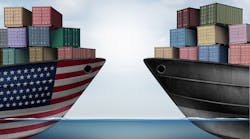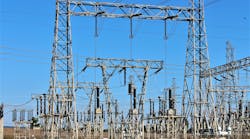I know that the current administration wants to “make America great again” but using tariffs to prop up our homeland infrastructure is not the right approach to apply at this time.
The U.S. electric power industry can ill afford the extra costs that would be incurred with the placement of 10-25% tariffs on iron, steel, and aluminum, core building blocks of our nation’s electrical infrastructure, with a good percentage of finished electrical apparatus, equipment and ancillary products manufactured with imported steel and aluminum.
The current pace of electric power grid modernization will be slowed, possibly in a dramatic manner, as prices paid for transformers, switchgear, cable and more than 100 other vital grid components –will necessarily increase to cover the additional costs imposed by tariffs. This is the likely outcome whether the equipment or the raw materials are imported - or are manufactured in the USA -
Many utilities will simply be forced to delay or scrap plans for infrastructure modernization if the costs of such projects are increased by as much as 10-25%.
Perhaps some good news on this matter can be found in the Congressional Research Service’s 2016 article written by Ms. Caitlain Devereaux Lewis entitled “Presidential Authority Over Trade: Imposing Tariffs and Duties” https://fas.org/sgp/crs/misc/R44707.pdf
The article’s lead paragraph reads as follows:
The United States Constitution gives Congress the power to impose and collect taxes, tariffs, duties, and the like, and to regulate international commerce. While the Constitution gives the President authority to negotiate international agreements, it assigns him no specific power over international commerce and trade. Through legislation, however, Congress may delegate some of its power to the President, such as the power to modify tariffs under certain circumstances. Thus, because the President does not possess express constitutional authority to modify tariffs, he must find authority for tariff-related action in statute.
As you read further on, it is clear that over the years, and by means of various international agreements, Congress has indeed handed over constitutional authority to the President in several trade and tariff-related matters.
Now to the issue of jobs in the utility and power equipment manufacturing sectors that could be lost as a result of tariffs, vis-à-vis the supposed jobs saved and new jobs created in the metals manufacturing sector.
There are in fact some localized, short-term benefits that could result for the metals-related industries in the United States. However, we believe that these thousands of additional positions will be more than offset by the hundreds of thousands of potential job losses in the utility equipment supply-side industry sector, as well as cutbacks in utility spending that would affect product distribution channel members, consultants and smaller equipment manufacturers.
With fewer utility construction/renovation/upgrade projects able to pass cost-benefit muster at 10-25% higher equipment prices, there will be less need for project engineering managers and support teams within the utilities, and, in turn this will be an impetus to cut back on power equipment manufacturing positions.
According to a very recent Reuters statement, the United States is the world's biggest steel importing nation, buying 35.6 million tons of the raw material in 2017. We rely on imported steel and aluminum from our Northern neighbor and strongest ally, Canada. We also rely on Brazil, South Korea and Mexico for steel. We import aluminum from Russia, The UAE and China. If NAFTA is included in the proposed tariffs, then the U.S. will have some real issues with it bordering neighbors. If Canada and Mexico are to be exempt from the tariffs, such action will help lower the negative economic impact of tariff actions.
I am a firm believer that the United States should have sufficient internal metals processing and manufacturing resources that will help ensure national security concerns – and we simply don’t have that without the help of the additional capacity obtained from our allies and others at this time. However, the application of tariffs today does not at all insure that additional U.S. manufacturing capacity will be developed in the near term or even the mid-term.
Higher domestic metals production costs will have a negative effect on the prices paid by metal-consuming/using industries, and in the end, will mean higher prices for American-produced goods. American consumers will eventually pay the price for tariffs imposed on imports. I understand that “foreign dumping” of steel and aluminum at below production costs hurts our domestic, and other Western nation, manufacturers that simply cannot compete with such unfair pricing. Dumping does need to be stopped, but the question for me is this: Do we punish all for the bad actions of a few? I would hope not, for we can ill afford to lose the trust and friendship of our international allies and trading partners.
The United States is a leading export economy, with many of our Fortune-tier companies relying on exports for more than 50% of their revenues. The majority of our mid-tier power equipment manufacturers also obtain a high percentage of revenues from international clients. Imposition of tariffs will hurt the efforts of these companies to expand or even maintain their international revenue bases.
P.S. A few years back, (OK, many years back) I was fortunate indeed to have studied Industrial Economics at Fordham University under the tutelage of William Hogan, SJ. Father Hogan was a Presidential advisor to five sitting U.S. Presidents and often provided Congressional testimony on the steel industry. He was known around the world as the “steel priest” for his work from the 1950s through 1980s with iron and steel companies in the United States and internationally. He was a great mentor to all his students over the decades. You could tell him apart in the many corporate board room meetings he attended – as he was usually the only person in a Roman collar!


